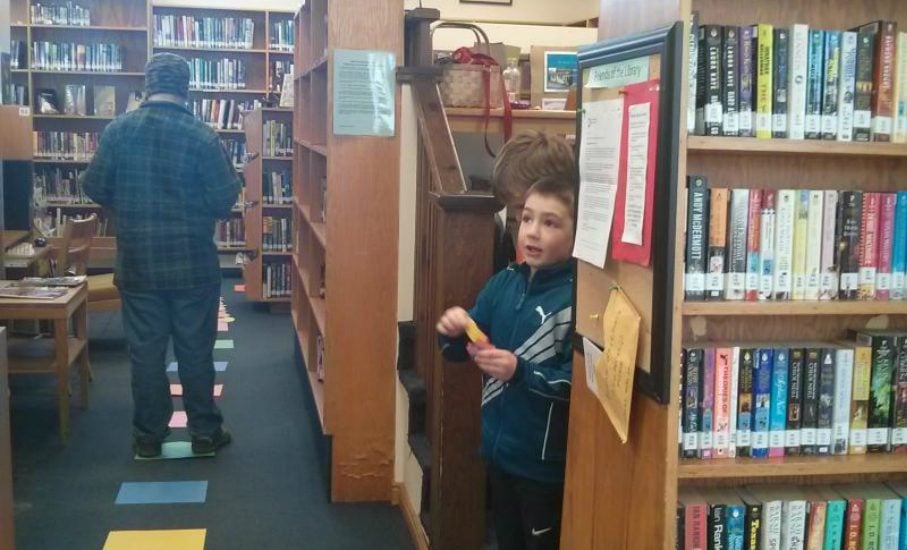KJIPUKTUK (Halifax) – Hard times have hit on public libraries in rural Nova Scotia. Insufficient funding by the province means that librarians everywhere are looking at reducing staff and budgets, cutting back on operating hours, and even closing entire branches.
The province provides the lion share of funding, additional funding comes from municipal units and through fundraising efforts.
It’s death by a thousand cuts. For eight years now governments have mostly frozen already meager library budgets. Meanwhile everything gets more expensive.

“What we have been doing to offset that shortfall is cutting in the background,” says Denise Corey, chief librarian of the Cumberland Public Libraries.
Next year she faces a $34,000 deficit, and plans to reduce operating hours in all of the seven branches. Corey talks about possibly closing an entire branch in 2018 if the government doesn’t come through with much-needed relief.
We are nickeling-and-diming everything. Denise Corey
“We already eliminated a position. We reduced our spending on library materials, on online newspapers and magazines. We are canceling the ancestry database and our movie license for the county, and we are nickeling-and-diming everything,” says Corey.
What is happening in Cumberland is the new normal province-wide. We talked to four chief librarians, and while for some the issues are more urgent than others, their stories are similar.
They’ve squeezed every efficiency out of the system, and reduced spending while trying hard to shield users. Now operating hours and entire branches are on the cutting block. Only the Halifax Public Library system, which receives most of its funding from the City, is in a (slightly) better financial state.
Cutting back on library services only hastens rural Nova Scotia’s demise, says Corey. The very same thing politicians claim they don’t want to happen.
“Take Advocate Harbour. It’s beautiful there, it is a fishing community and it has a school, a tiny medical centre, a corner store and a library,” says Corey. “If I have to close the library there, that is just killing that town. Yet people there are 45 minutes away from the next nearest library. We have to provide services to these people too.”
We’re heading down that same road. We are just a little bit behind them
All public libraries in rural Nova Scotia are facing serious funding issues. Yet some are doing better than others.
The Annapolis Valley Regional Library. With its eleven branches covering an area between Annapolis Royal and Windsor it is one of the larger library systems in the province. Some of its communities are relatively well off, and its residents are generous.
Thanks to that generosity and the communities’ fundraising skills six of of the eleven library sites expanded, renovated or moved into a brand new space in just the last 18 months, says chief librarian Ann-Marie Mathieu.
That energy brings its own problems.
“When you have such a local groundswell of support for libraries, people expect us to increase the services and expand the hours of operation.That’s getting more and more difficult,” says Mathieu.
Already the library is reducing staff at its headquarters in Berwick by three to four employees, thankfully by attrition, to deal with a $125,000 deficit this year. Even more serious problems are on the horizon,
“We managed to become more efficient. But at some point we are going to run out of options, and we have to discuss at the board level if we are going to cut back on some of our services and hours of operation or even cut entire branches. Other regions have already gone there, and we’re heading down that same road. We are just a little bit behind them,” Mathieu says.
We asked the department of Communities, Culture and Heritage if it was aware of the library staff and service reductions.
In its response spokesperson Marla MacInnis refers to the $14.4 million per year the department provides to support the operation of public libraries throughout the province. But MacInnis didn’t indicate whether the department knows about the issues raised by the chief librarians we interviewed for this story.
She does provide a list of one-time grants the department has provided over the last year. $1000 for a songwriting contest in Cape Breton, $1,500 for a Lunenburg literacy festival, and a total of $26,000 for tangentially related computer access through the CAP program.
It’s a short list.
Hunger games for librarians
Librarians believe that the government neglect is willful.
Librarians have long argued that the current funding formula based on population, is not workable. After all, it costs the same to keep a library open, whether you service 100 or 200 people a day. And with depopulation of rural Nova Scotia happening at an increasing rate some library boards would see their funding shrink to almost nothing.
“We went through a funding review when the liberals first came into power, to begin looking at how to become sustainable, and to get a new funding formula not based on population,” says Eric Stackhouse.
It’s like rearranging deckchairs on the Titanic. Eric Stackhouse
Stackhouse is the chief librarian of the Pictou-Antigonish Regional Library. We highlighted the very serious budget shortfalls Stackhouse faces in a story we posted just about a year ago.
“As we were about to begin the review the province told us that there would be no new money. It’s like rearranging deckchairs on the Titanic,” says Stackhouse.
“We all agreed that without increased finding it was bound to fail. That was the problem with it. The government set us up for failure,” says Stackhouse.
Laura Emery is the chief librarian for the Eastern Counties Regional Library, serving Guysborough, Inverness and Richmond Counties. Her area is hit particularly hard by rural out-migration. Hard to fund-raise, when nobody has money, she says.
Emery has perhaps the most apt metaphor for the government’s approach.
“It’s like hunger games for librarians. Your library must die so ours can live,” she says. “But that doesn’t work for library people The government pits library regions against each other to redistribute what is essentially not enough money.”
Emery emphasizes that in the big picture the money that government provides to libraries is really not that much. Libraries in all of Nova Scotia get $14 million, while just the infamous rebuild of the Bluenose will cost $25 million.
Time to speak up
If we had a million dollars, says Emery, just imagine what we could do with that.
“My job is to turn money into public reading and public learning and public good. I should be focused on that. But unless things improve, I am going to spend the rest of my career retracting services. Three years out some locations in our region will be closed.”
“The government has to play a leadership role here,” she says. “It has to ensure that quality libraries exist from one side of the province to the other.”
Corey hopes people will speak up.
“I urge people to contact their MLA,” says Corey. This is an issue for the entire province. I am shouting now because I know next year I will be in trouble. Anybody who thinks libraries are important should be contacting their MLA.”
Please support the Nova Scotia Advocate so that it can continue to cover issues such as poverty, racism, exclusion, workers’ rights and the environment in Nova Scotia.




Libraries should be a priority nation wide. As a retired teacher who studied English Literature, History and Education I defend any library but especially a rural one. When I was young I didn’t have access to a rural library and I was desperate for books.
In small towns like Baddeck the library isn’t just a place to borrow books; many functions take place there including Yoga, Qi Gong, Meditation, all free. There are films, speakers including poets, spiritual leaders, and local authors. People can also buy used books, which helps support the library, as well as borrow skies, snow shoes and other sport items that local people may not be able buy. The library is the heart of the town.
I use the South Shore Public Library in Bridgewater — but since they moved to the LCLC Center I now use the bookmobile. The LCLC centre was a bad move as far as I am concerned, you have a long walk from the parking lot to the Center and then you have to walk the whole length of the building to get to the library — this is not good for seniors. I am thankful for the bookmobile and the wonderful staff they have.